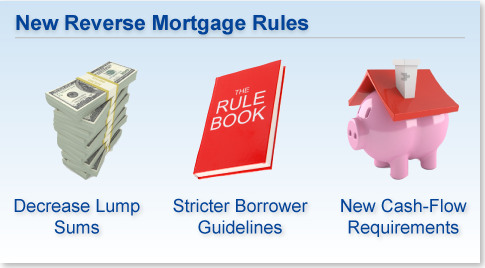FHA Makes Changes in HECM Reverse Mortgage Rules
Will there be new reverse mortgage rules in 2013?
I read that the FHA is running a deficit and may need a bailout. Also, the HECM (reverse mortgage) program is a huge drain. Will this affect their reverse mortgage program? Will there be new reverse mortgage rules?
Update - September 20, 2013
Since our last update on December 18, 2012 a lot has changed. First, the FHA abolished the Standard Fixed Rate HECM loan. Then, in September 2013 they announced big changes in their HECM loan, which will effectively lower the total loan available in the first year, and changes in the way the lender evaluates the borrower.
Thank you for your question about reverse mortgage rules. We have seen big changes in the Home Equity Conversion Mortgage (HECM) - or commonly referred to as reverse mortgages - program.
Background: Why Make Changes in the Reverse Mortgage Rules?
The two main reasons that the FHA is making the changes are:
- The FHA is losing money and is on the brink of a bailout. A disproportionate amount of their losses are due to the HECM reverse mortgage program.
- Due to the way the HECM loan is structured, many borrowers take out too much equity from their homes. Some borrowers are then left with insufficient funds to cover their monthly expenses.
In fact, Sen. Corker (Tennessee) suggested a moratorium on HECM loans. Sec. of Housing and Urban Development (HUD) Shaun Donovan noted in his Senate testimony before the Senate Banking Committee on December 6 2012, that there is a real need for a reverse mortgage and it benefits some consumers.; however he too realizes that there is a need for major changes in the reverse mortgage rules. Some of these changes can be made by the Federal Housing Authority (FHA) and some require Congressional action.
Although no moratorium was made, real changes have been made to the reverse mortgage rules.
Quick Tip#1
Bills.com reminds you to move with caution. Learn about a reverse mortgage and its pros and cons and how to avoid scams.
Addressing the Main Reverse Mortgage Rules
Back in late 2012 Sec. Donovan indicated that the FHA is prepared to take short-term to long-term actions to rectify the problems in their reverse mortgage programs. Their goal is to create new reverse mortgage rules that will allow consumers to take a safer product. In mid-September 2013, sweeping changes have been made in three main areas that will be addressed are shown in the chart below:

Eliminate or Decrease Lump Sums
The new reverse mortgage rules significantly affect the way you can borrow money on a reverse mortgage. Although lump sum draws were not eliminated big changes were made in the amount of money you can take and when you can take the money. One of the major problems with the reverse mortgage program is the misuse of the home equity. Many borrowers take out the maximum amount of money in a lump sum. Part of the reason for this is that a fixed rate reverse mortgage is available only if you take a lump sum.
New Reverse Mortgage Rule:
Starting September 30, 2013 all new HECM loans have strict rules regarding the amount of money you can take. Here are two of those changes:
- Less upfront cash: The new reverse mortgage rules severely limit the amount of cash you can receive upfront and during the first 12 months of the loan.
- Less total money: The new tables allow for less total money, as the FHA abolished the Save and Traditional tables and combined them into one table. The new tables allow for about 15% less than the traditional HECM and are similar to the Saver program.
For more details about these reverse mortgage rule changes, Read the Bills.com article about HECM loan rule changes.
You can take your reverse mortgage in a few methods, as follows:
- Lump Sum Payment
- Fixed Monthly Payment (can be for a set period, or the life of the borrower)
- A line of credit (which is adjusted based on the amount you draw down and the interest rate).
- A combination of all those methods.
By choosing a lump sum (and taking the maximum allowable amount) many borrowers make themselves financially vulnerable. Some borrowers deplete their equity and then don’t have sufficient funds in case they need to leave their home.
Tip
The lump sum is in general a poor financial choice for most borrowers. Your home is a valuable asset, that needs to be considered over the long run. Make sure that the reverse mortgage fits into your long-term financial retirement plan. It is not meant to pay off debts, take vacations, increase your standard of living - and then leave you with no assets in case you need to move from your primary residence.
Quick Tip #2
Use your reverse mortgage to help you stay in your house. Get a reverse mortgage quote from a Bills.com reverse mortgage provider.
Stricter Borrower Guidelines and Rules to Ensure Housing Payments
New reverse mortgage rules in 2013 include stricter borrower guidelines. The main focus of the changes is to ensure that the borrower has sufficient funds to maintain their monthly expenses and especially those relating to housing.
New Reverse Mortgage Rule:
Starting September 30, 2013 all new
HECM
loans have strict rules regarding how borrowers qualify for a HECM loan. Here are two of the major changes::
- Borrowers's credit and financial capability: The lender now needs to check the borrower's credit score and financial capability.
- Escrow type accounts: In some cases the lender need to make sure that the borrower has sufficient funds to cover their property tax, homeowner insurance and maintenance costs. This could entail requiring a set-off of certain loan funds to cover those expenses.
For more details about these reverse mortgage rule changes, read the Bills.com article about HECM loan rule changes.
Reverse mortgages have no monthly principal or interest payment, however they do require that your maintain your basic housing payments, including:
- Property tax
- Homeowners insurance
- House upkeep and maintenance
Although HECM reverse mortgage loans require, by law, mortgage counseling, still too many borrowers do not correctly calculate their financial needs. One common problem is that borrowers don’t make those payments and then default on the loan.
Quick tip #3
If you are considering taking a reverse mortgage to settle debt problems, then think again.
from a pre-screened Bills.com debt relief providers.
New Reverse Mortgage Rules - You Benefit
Anyone who looks at the poor performance of the FHA HECM program, which accounted for a disproportionate amount of their losses, knows that big changes are needed the reverse mortgage rules. As Ethan Ewing, President of Bills.com notes in his reverse mortgage video," ...a reverse mortgage can be a great product for the right people. Most importantly, it allows them to stay in their home, so for the right person the right situation, reverse mortgage can be an absolutely great product".
For most, building up equity in a house takes a long time. Don't throw that away by taking a reverse mortgage that doesn't fit your needs. A reverse mortgage is a complex financial product. Stricter reverse mortgage rules will help many consumers avoid the dangers of a reverse mortgage. Making sure that you have enough cash to pay your monthly bills and avoiding depleting your equity are winning rules for everyone, the lenders, the borrowers and the FHA.
Quick tip #4
Before taking a reverse mortgage carefully evaluate your long-term financial needs. Then make sure you shop for the right loan and best terms.
from a Bills.com reverse mortgage provider.

In cases where the appraised value is less than the balance due on the loan, the lender does not have recourse against the heirs. In other words, the lender made a bad bet, lost, and must suffer the consequences alone.